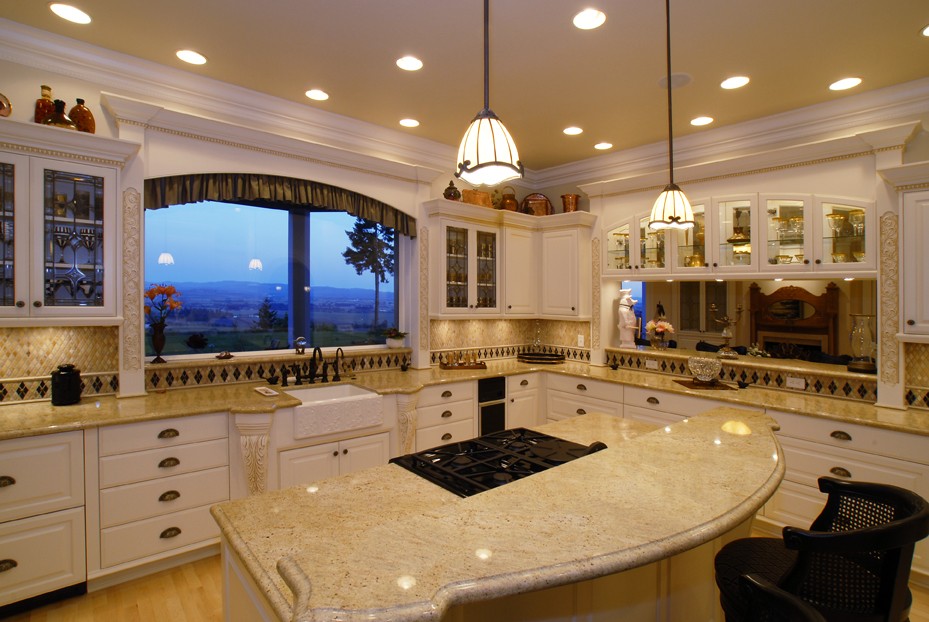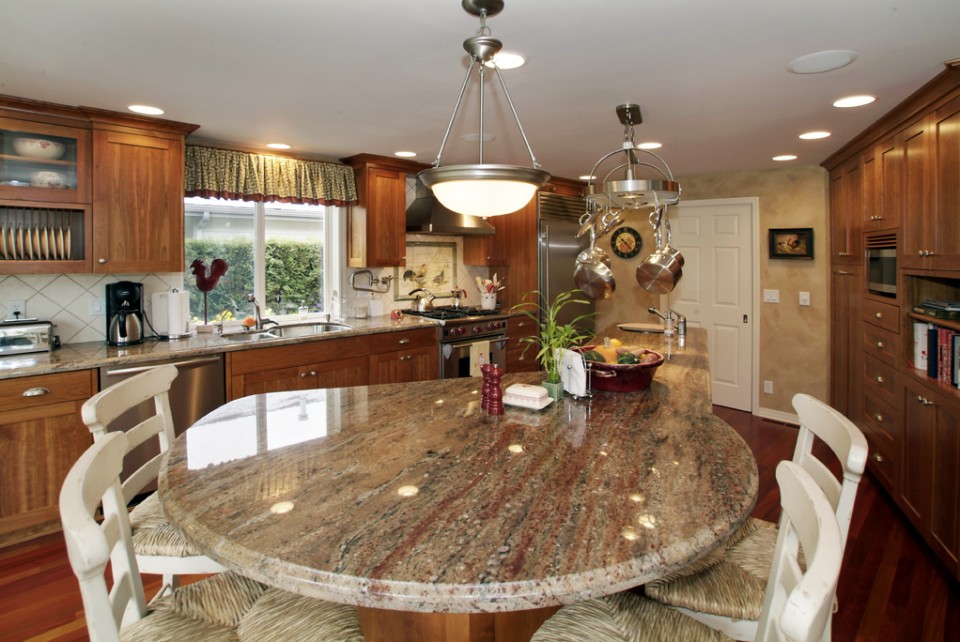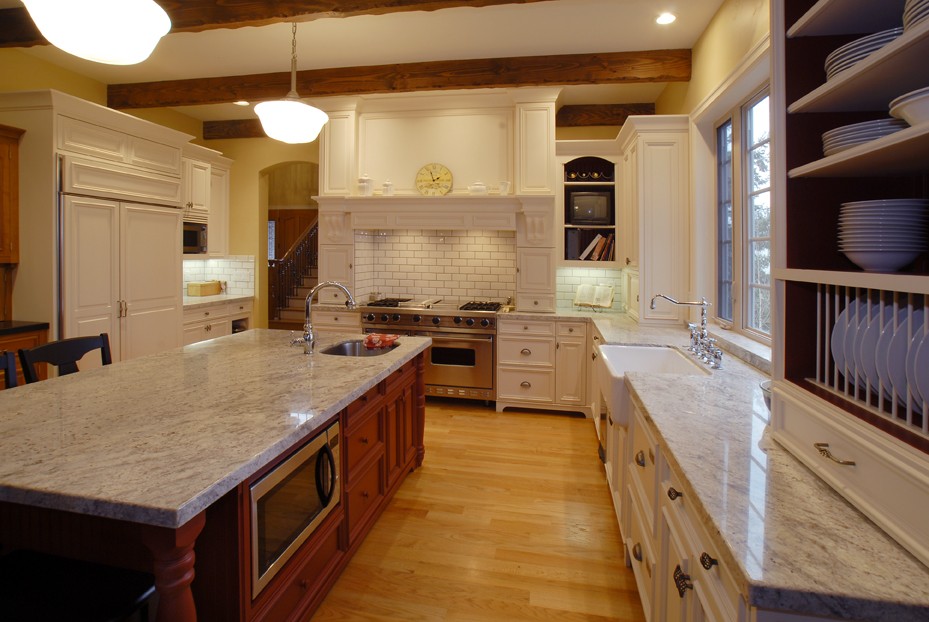[vc_row][vc_column width=”1/3″][vc_single_image image=”1324″ css_animation=”left-to-right” img_link_target=”_self” img_size=”full”][dt_gap height=”20″][/vc_column][vc_column width=”2/3″][vc_column_text]
Granite Countertop Maintenance
We get various questions from homeowners regarding the maintenance of their granite countertops. Granite is perceived to be durable and maintenance free, and in most cases that applies to most stone counters, but not all granite is the same. Although granite is extremely hard, some of the minerals in it may be very soft, depending on the type of granite. The type of finish may affect how often the countertop should be cleaned and sealed. A polished finish is more desirable in the kitchen because it is easier to keep clean. Other finishes, such as, honed, flamed, sand blasted and brushed are available but will require more attention to the maintenance of the countertop. Knowing how and when to clean and seal your granite countertops will ensure they will maintain their beauty well beyond the life of your home.
The easiest way to keep your stone looking great is to avoid bad habits that may damage it. Granite, marble, travertine, limestone, soapstone, quartz and solid surface are similar in many ways, but their differences require varying degrees of maintenance.
If you utilize the granite care and cleaning procedures that follow for all your countertops no matter what type of stone or surface, you’ll eliminate most potential problems without ever having to think too hard about it or worry that you may be causing damage.
- Use coasters under all glasses, bottles and cans. Again, it’s difficult to etch granite and using coasters on dense and/or properly sealed granite is not an absolute necessity like with marble, but using coasters is just a good practice to protect all surfaces.
- Use trivets and hot pads under pots, pans and dinnerware. Yes, you can take a hot pot off the stove and put it right on granite, quartz or soapstone without any problems. Not true for all other surfaces. But you must consider other issues as well, such as, excessive heat may discolor or breakdown the sealer.
- Use cutting boards. Again, avoid the possibility of scratching the surface and protect your knives. Cutting on stone will dull and damage your knives’ edges quickly.
- Avoid allowing acidic foods such as lemon juice, vinegar and soft drinks to be left on the surface for any amount of time, as they can etch the surface.
- Although granite is extremely hard, some of the minerals in it may be very soft. The existence of different minerals is what makes the granite easy to scratch, be chipped or break along the grain. In order to protect the surface, it is recommended to avoid dragging pots, pans or appliances across the stone. Scooting something across the countertop that has even a grain of sugar under it will scratch the polished surface. Scratches allow stains to mar an otherwise beautiful surface.
Granite countertops are one of the easiest surfaces to clean, but there are a few rules you must pay attention to. With a little daily and weekly attention, your granite countertops will look it’s best for years to come.
Daily cleaning of your granite countertop with clean, warm water and a soft non-abrasive cloth is a good habit to get into. This will make sure small spills and stains do not get a chance to set or penetrate the granite surface. It also pays to blot small spills immediately.
If you need to use a cleaning product to remove dirt and grime, be very sure to use a neutral (pH balanced) product, as alkaline or acidic cleaners will abrade the polish from your granite. If you’re not sure if the cleaning product is neutral, just be sure to avoid anything that contains vinegar, lemon, lime or ammonia. After using your chosen cleaning product, be sure to rinse the surface down to wash off any leftover residues. Then dry the granite with a soft cloth.

When you get a stain, quick action is needed. You can use a commercial granite countertop cleaner or try one of these other suggestions:
- If you have a spill on your granite countertop, be sure to blot it up immediately. Do not wipe up spills because this will just spread the potential stain.
- To remove organic stains like fruit, coffee or tea stains from your granite countertop use hydrogen peroxide and 2 or 3 drops household ammonia. Blot dry.
- If you have a grease stain on your granite countertop, mix a paste of liquid dish soap and water. Scrape away any residue you can, then apply the mixture and blot stain spot. Repeat as needed.
- When cleaning granite countertops with stubborn stain, mix flour with 2 tablespoons liquid dish soap and apply to stain. Cover with plastic wrap and let sit overnight.
- For wine, ink or stains from a marker use acetone or lacquer thinner on dark granite, and hydrogen peroxide on light granite. Leave for 30 minutes then remove and rinse clean.
- If you get an oily stain on your countertop such as milk, oil or grease make a paste of flour and hydrogen peroxide over the stain, cover with plastic wrap and let sit for 8 hours or so. Remove the plastic wrap and scrape away flour mixture with a wooden or flexible plastic utensil to prevent scratching. This mixture will draw the stain to the surface. Repeat if necessary.
- Never use anything abrasive like steel wool, scouring pads or scouring powders on your granite countertop. Do not use vinegar, lemon or orange as cleaners, as well as, bathroom, tub & tile or grout cleaners as the acid in these products can etch your granite countertops.
You should clean your granite countertops regularly; however, periodically you should reseal your countertop as well. Keep in mind that different pieces of granite have different porosities. Some countertop areas may need to be sealed more often than others. To determine if it’s time to reseal a countertop, dribble some water onto the countertop. If it beads up, great, if the water soaks into the granite, it’s time to reseal.

By its nature, granite is moisture-resistant, however, it’s also porous. Sealants block liquids from seeping into the granite. A properly sealed countertop will cause liquids to bead on the surface. Dan Olson from Custom Countertops in Salem says, “Not all granite countertops need to be sealed, but most granite countertops receive additional benefit from being sealed. That benefit is allowing the homeowner more time to wipe up a spill, thus minimizing dirt, moisture or stains from migrating into the stone, making the granite surface easier to clean.”
Liquids with color like grape juice and red wine, cooking oil and fat can all discolor the countertop. Pizza grease can be a culprit, too, when it soaks through the bottom of the pizza box and onto the countertop.
Sealing is straightforward. Get a good-quality granite countertop cleaner, a granite sealer that’s designed to resist water and oil-based stains, and some clean rags. Follow the cleaner’s directions first, then, make sure the granite is dry before you start sealing. Some sealers, such as those with a solvent base, are good for several years.
If you don’t feel comfortable cleaning stained countertops or you would prefer a professional apply the sealer on your countertops, please contact Kaufman Homes and we’ll be happy to provide that service.
In addition to its strength, granite is a very beautiful stone that adds color and warmth to any kitchen. With just a little care to protect their beauty and utility, granite countertops will last a lifetime.[/vc_column_text][dt_gap height=”10″][/vc_column][/vc_row]

